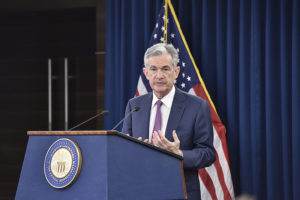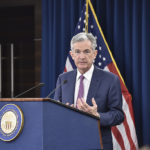You have watched over the past week as the UK bond market and the pensions that rely on it have gone on a rollercoaster ride trying to maintain their solvency in the face of rapidly rising interest rates. The Bank of England, one of the world’s foremost central banks and the UK’s arbiter of monetary policy, has been raising rates at historic speeds to tamp down on the inflation it created by lowering rates to historic lows. If you’re getting whiplash trying to keep up with the bank’s policies, you’re starting to understand how pension managers are feeling after adjusting their plans to the low-rate environment. In The Wall Street Journal, economist Judy Shelton explains the manipulative power of central banks, writing:
Politicians may debate whether big-government socialism or free-market capitalism leads to better economic outcomes. Their constituents may worry about rising prices and declining prospects for retirement. But neither group has the power to create money with no questions asked, manipulate the cost of capital, or counteract movements in financial markets. The central bankers are in charge—and perhaps that should change.
Even if duly elected leaders try to make good on campaign promises, they face hurdles if monetary authorities, domestic and global, disagree. What happened in Britain is a cautionary tale for nations that have relinquished to central banks the keys to economic performance. British Prime Minister Liz Truss, together with her finance minister, Kwasi Kwarteng, last month announced plans to spur investment and economic expansion by cutting taxes for individuals and businesses. Days later, they were verbally lashed by Mark Carney, a former governor of the Bank of England, for “working at some cross-purposes” with the nation’s central bank.
Mr. Carney, who is now United Nations special envoy on climate action and finance, lamented that the new U.K. government was trying to stimulate short-term growth just as the Bank of England was trying to restrain it to control inflation. While the approach championed by Ms. Truss and Mr. Kwarteng aims to expand economic output by providing incentives to increase supply, the Bank of England is committed to fighting inflation by reducing demand—which requires raising interest rates to choke off growth. When the budgetary plans were poorly received by market investors, the central bank had to buy long-term government bonds to rescue the pound in foreign-exchange markets—causing interest rates to fall.
Then there’s the audacity of the International Monetary Fund, which publicly rebuked the U.K. government’s budget and urged it to “re-evaluate the tax measures, especially those that benefit high income earners.”
Since when did unelected monetary officials gain the authority to tell political leaders what to do? It’s unseemly, but perhaps not surprising: When government organizations are imbued with breathtaking powers to determine financial conditions, it magnifies their clout—and elevates their status.
The coterie of major central banks that manage the global economy are leery of spurring demand through excessive fiscal stimulus. But there is a difference between government overspending, which borrows from the future to pay for current consumption, and tax-cutting incentives now to spur more production down the road. Government borrowing to finance socialist redistribution isn’t the same as government borrowing to invest in entrepreneurial capitalism.
But central banks, led by the U.S. Federal Reserve, have embraced the notion that curbing demand is the road to monetary redemption. That same Fed not long ago failed to anticipate the pervasive inflationary pressures unleashed through the extraordinary fiscal and monetary measures to mitigate the economic consequences of the Covid-19 shutdown.
Fed Chairman Jerome Powell insists that “price stability is the responsibility of the Federal Reserve,” but this is posturing rather than accountability. The central bank doesn’t compensate Americans for expropriating some of their wealth by diminishing the dollar’s purchasing power. And the 58% of Americans invested in the stock market won’t be comforted by former New York Fed President William Dudley’s warning this year that the Fed will “have to inflict more losses on stock and bond investors” to contract economic activity through tightened financial conditions. Citizens harmed by such moves have little recourse.
While Mr. Powell championed “supportive” monetary policy to foster economic growth and “as strong a labor market as possible for the benefit of all Americans” in announcing the Fed’s revised monetary policy framework in August 2020, he now seeks to raise interest rates to “restrictive” levels and believes “we need to have softer labor market conditions.” So much for maximizing employment.
Beyond the Fed’s dual mandate, our central bank is responsible for providing a stable monetary and financial system. But for all its powers to set interest rates, it’s not clear that supply-and-demand forces wouldn’t have set rates more appropriately and achieved better results. Is credit allocated more efficiently through central planning or free-market price signaling?
The hair-trigger reaction of financial markets to the latest utterances of monetary authorities is unsettling. Government bond yields and currency values are vulnerable to the interplay of derivative financial instruments structured on underlying assets that world-wide total about $600 trillion, according to the Switzerland-based Bank for International Settlements. Contracts based on interest rates or foreign-exchange instruments account for 96% of that total.
It is time to question whether central banks have become too powerful, too prominent and too political. In the name of preserving central bank independence, lawmakers have ceded huge swaths of their own responsibility for ensuring the welfare of citizens through sound economic policies. By doing so, elected representatives have granted influence to unelected officials that is inconsistent with democratic norms and limited powers.
It will require a Copernican revolution to shift the field of monetary theory from an understanding of economic performance that doesn’t put central banks at its core. But it’s a change that must be made if we are to prevent further demoralization of free markets and free people.
Action Line: President Trump attempted to put Ms. Shelton on the board of governors of the Federal Reserve, but she was blocked by all the senators you would expect to protect the establishment power of the Federal Reserve. The Fed could have used Shelton’s clarity now as it tries to mop up the problems it created with extraordinary bailouts and policies. If you’re wondering about why markets are down and inflation is up, and how to deal with that in your investment portfolio, let’s talk. In the meantime, click here to subscribe to my free monthly Survive & Thrive letter, and you’ll learn more about me and how I help American families improve their personal and financial security.















